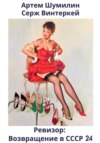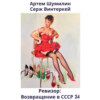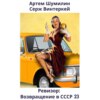Читать книгу: «The Merry Anne», страница 12
CHAPTER XIII – WHISKEY JIM
BEFORE the four men left the house Wilson revived and asked for his chief. Beveridge, his torn coat thrown aside, hurried back and bent over the bed. “What is it, Bert?”
“That’s what I was going to ask you. I don’t remember – exactly – ”
“You were running around the house when somebody winged you. It doesn’t amount to anything – you ‘ll be around in a day or so.”
“Oh, yes – that’s it. It was some fellow behind, wasn’t it? I remember I didn’t see anybody ahead.”
“Yes – he was a little below the bridge, as I figure it.”
“Yes – yes – don’t you see, Bill? That’s where Harper was – he stayed behind with some yarn about his shoe – had a stone in it.”
“Keep quiet, Bert! don’t get worked up – ”
“But think of it, Bill! What you going to do now?”
“I’m going to find the man that hit you.”
“Not with those two, Smiley and Harper?”
“Why, certainly.”
“But don’t you see, Bill? That’s just what they want. They’ve got rid of me – now they ‘ll draw you off into the woods – why, you’re putting yourself right in their hands!”
“You’d better try to think of something else, Bert. Mrs. van Deelen here is going to take good care of you. I ‘ll stop in on the way back.” And Beveridge slipped out the door without giving Wilson further opportunity to protest.
The others were waiting impatiently at the steps. Smiley and Harper at once started off toward the creek below the barn; and Beveridge set out on a run for the bridge, telling the farmer to follow.
When he reached the creek, Beveridge searched through the trees for some distance down-stream and then up-stream, but found no sign of a man. “Well,” he said, joining Van Deelen at the end of the bridge, “he got away all right.”
“Did you look under the bridge?”
“Yes. Nothing there.”
The farmer stood still for a moment, thinking; then he clambered down the bank and peered into the shadow under the bridge floor. “Come down here,” he said. And when Beveridge had reached his side, standing ankle-deep in the muddy water, he went on, “See that?”
“No – wait a minute, I can’t see anything yet. What is it?”
“Feel this rope. It’s been cut.”
“Oh,” murmured Beveridge, “I see. A boat.”
“Yes. He has stolen my boat.”
“Of course – and slipped off down-stream as easy and quiet as you like. He’s a cool hand, that Spencer. Come back up here – we ‘ll go on down and meet Smiley. Wait, though, he might be hiding anywhere down the stream here. Are there many bushes and such along the bank?”
“Yes, it’s grown up pretty heavy. I never had any reason for keeping it cleared.”
“Well, then, we ‘ll keep down here close to the water where we can see things.”
“It ‘ll be pretty wet. Will you wait while I get my boots? My rheumatism’s been pretty bad this year – ”
“Go back, then. I can’t wait for you.”
And with this, Beveridge pushed off down the stream. Van Deelen, after a moment’s hesitation, followed. They met the other party just above the barn.
“See anything?” asked Dick.
“Yes. He has gone down in a boat.” Beveridge turned to the farmer. “Does the creek go on far in this direction?”
“No, it turns off south pretty soon.”
“Would it take him anywhere especial?”
“No – just into the woods.”
“No houses south of here?”
“Not for a long way.”
“And it’s sluggish like this all along, isn’t it? Full of snags and shallows?”
“Oh, yes, he couldn’t go very fast.”
“All right. Come on, boys.”
On they went, walking over the spongy ground below the bank or splashing softly through the water. They did not speak, but followed their leader eagerly through the moving shadows. The trees arched over their heads, the water slipped moodily onward, blacker than the shadows. Now and then they stumbled over projecting roots, or stepped down knee-deep in some muddy hole; all the while their eyes strove to pierce the dark, searching for a boat in the gloom of the opposite bank, or for a man among the bushes above, even glancing overhead into the trees, where a desperate man might have hidden. At length they reached an opening in the trees of the right bank, and Beveridge, stepping up, found that the road here paralleled the creek.
“Which way now?” asked Dick.
“No sign of a boat, is there?”
“No.”
“Then keep on down-stream.”
They divided now in order to watch both banks, for the creek had widened a little and the shadows were dense. It was Smiley and Harper who waded across, stepping down waist-deep in the water and mud. Not a word was spoken. The only sound was the low splash-splash of four pairs of feet, with now and then the noise of heavy breathing or a muttered exclamation as one or another stumbled into a hole.
“Hello – ouch!”
The voice was Pink Harper’s. At this point the trees had shut in overhead, and the dark was impenetrable. Beveridge and Van Deelen could see nothing across the creek, not even the blot of denser black which told Smiley, only a few feet behind, where his companion had stopped.
“What is it?” came in a low voice from Beveridge.
“Hit my shin. Hold on – feels like a boat. Guess you’d better come across.”
Without a moment’s hesitation the special agent turned to the left and plunged into the stream. At this point it was deeper, and he found himself submerged to the armpits. To save time he drew up his feet and swam across until his knees struck bottom. And then the three of them, – Van Deelen waited on the farther bank, – now dimly visible to each other, stood side by side feeling of the boat.
“You ‘ll have to come over here,” said Beveridge to the farmer, “and tell us if it’s your boat.”
Van Deelen had no mind to swim. “Can’t you strike a match?” he asked.
“Strike your aunt!” growled Beveridge, wringing his wet clothes.
“Well, say, that ain’t necessary anyhow. My boat’s the only one on the creek.”
“Why didn’t you say that before I swam over?”
“Well, I – ”
“You want to watch out or you ‘ll be coming down with brain fever one of these days. Come, boys, we ‘ll go back.”
“You think what he did was to take to the road back up there and set the boat adrift?” asked Pink.
“Of course.” The words came from the deeper water, where the special agent was already swimming back. A moment more and Dick and Pink were after him.
“Now, Mister van Deelen,” said Beveridge, when they had gathered together, “take us to the road.”
“It’s right back up-stream. You know where it is as well as I do.”
“Can’t we strike right over through the woods?”
“Why, yes, you could do – ”
“All right, Dick. It ‘ll be lighter when we get up out of this hole.”
They floundered through a hundred yards of undergrowth and finally came upon the open road. They were a dismal enough party. The water in their shoes gurgled when they moved and spurted out at the lacings in little streams. Other streams ran down their clothing to the road, where the sand drank them up. Beveridge was without coat or collar, and the others were nearly as dilapidated. The physical strain of the chase, and the loss of sleep, not to speak of Beveridge’s fight with McGlory, had worn them down nearly to the point at which nature asserts her peremptory claims, – but not one of them knew it. They did not know that they were a desperate spectacle in the eyes of the bewildered farmer; even if they could have stood in the light of day and looked full at one another, it is to be doubted if any of the three would have observed the deep-lined, white faces, the ringed eyes, of the other two. For the spirit of the chase was in them.
“Now, Mister Van,” said Beveridge, almost gayly, “how far is it to the next house?”
“Why – why – ”
“Don’t think too fast. A man died that way once.”
“There’s an empty house about a mile from here.”
“All right, we ‘ll make for that. I want you, Van Deelen, to hitch up a wagon and come on after us as quick as you can.”
The farmer turned at once and walked rapidly up the road.
“Spencer hasn’t much start of us,” said Beveridge, as the three men started in the opposite direction.
“He couldn’t have. It took him a good while to work down here in that boat. We ‘ll get him if he keeps the road.”
“He ‘ll have to do that. If he took to the woods, he would be lost in an hour – and that means starvation.”
Pink ventured a pleasantry, “Maybe he’s got a compass,” of which the special agent took not the slightest notice; but said, turning to Smiley, “How are your legs, Dick?”
“Fine. Trim as they make them.”
“Feel up to a dog trot?”
“Half a dollar even, I ‘ll beat you to the deserted house.”
“Hold on, don’t get to sprinting. Save your wind. An easy jog will do it.”
All three fell at once into an easy running gait, Smiley and Beveridge side by side, Pink laboring along in the rear.
Five minutes later Beveridge paused for breath. “We must have run nearly a mile by this time, boys.”
“Easily.”
“Not so loud. Doesn’t it look to you as if the road turned – up ahead there?”
It did look so; and as they went on toward the turning it grew plain that they were approaching a clearing.
“Wait, boys,” whispered the special agent. “This ought to be the place, – we don’t want to move quite so carelessly now. Dick, you go around to the left, and I ‘ll take the right; Pink, you give us two or three minutes and then move in quietly toward the clearing. In that way we shall all three close in together. Wait a few minutes now.”
The two men disappeared in the woods, one on each side of the road, and Pink was left alone in the shadows. At first he could hear now and then a low rustle as one or the other brushed through the bushes, but soon these sounds died away. He was standing in the shadow at the roadside, gazing with fixed eyes at the opening in the trees and stumps a hundred yards farther along. He wondered if the three minutes were up. It was too dark to use his watch. Waiting there under the stars, the minutes spun out amazingly; all sense of the passage of time seemed to have left him. He moved forward a few steps, – but no, it was too early; Dick and Beveridge had surely not had time to get to their positions. Still, what if he should wait too long, and not arrive in time to act in concert with the others?
Out on the Lakes, with a slanting deck underfoot and a dim shore-line somewhere off in the night, Pink’s soul would have thrilled in unison with the stars, but here, buried in the gloom of the pine stumps, – those straight, blackened poles that stood in endless monotony, – his soul was overwhelmed. A panic seized him; he knew he would be late; and he took to gliding along in the shadows, nearer and nearer, until, seeing plainly that the road swung around to the right, and that the clearing was overgrown with tall weeds and was surrounded by a stump fence, he paused again. His feet sinking at each step in the sand, he made no sound.
He stood motionless. Over the weeds he made out the sagging roof of a small building. Then, forgetting that his own figure was invisible against the black of the forest, he dropped to the ground and, flat on his face, wriggled forward. A row of sunflowers grew inside the fence. At one point was a cluster of them, standing out high above the weeds. Cautiously inch by inch he crept nearer. The bunched stalks, outlined so distinctly against the sky, fascinated him by their resemblance to the hat, head, and shoulders of a human being.
Nearer – nearer – a moment more and he would be able to place his hand against the fence. He was holding his breath now; afterward he could never tell what was the slight noise he must have made. Or perhaps it was the sense that tells one when a person has silently entered a room that caused the figure – just as Pink, lying there on the sand and looking up, had made sure that it was a figure and not a clump of sunflowers – to look around, up and down. Pink scrambled to his feet and plunged recklessly forward. The man, who had been sitting on the fence, quietly dropped down on the inner side.
A stump fence is not easy to climb, and Pink was on the outer side, where the tangled masses of roots spread out into a cheveau-de-frise which, in the dark, seemed insurmountable. When he had finally got to the top, at the expense of a few scratches, a disturbance in the weeds near the front of the house told him where the fugitive had taken refuge. He promptly set up a shout.
“Ho-o-ho!” came simultaneously from Smiley and Beveridge.
“Here he is!”
“Where?”
“In the – ” Pink was balancing on the fence. Before he could finish his shout a revolver shot sounded from the house, and he went tumbling down into the enclosure.
“What’s that! Are you hit?”
“No – just lost my balance. Close in – he’s in the house.” He was getting to his feet during this speech and feeling himself, not sure, in spite of his statement, whether it was the noise or the bullet that had upset him. But he could find no trace of a wound.
“Keep your places!” Beveridge was calling to the others. “Keep your places! Now then, Mr. Spencer, we have you cornered. You can have your choice of giving up now or being starved out. Which will it be?”
No answer from the house.
“Speak up! I don’t propose to waste much more time on you.”
This time the fugitive decided to reply; but his reply took the form of a second shot, sent carefully toward the spot in the weeds from which the voice seemed to be coming.
“Hi!” shouted Pink, “did he get you?”
“No. Shut up, will you?”
The man with the revolver was plainly an old hand, for now he fired a third time; and the shot came dangerously near, whether by luck or otherwise, to shutting up the speaker for all time. Beveridge dropped hastily behind a log that lay at his feet. Then, disgusted with himself, he scrambled boldly up and stood on the log.
Pink was obediently silent, ‘though trembling with excitement. The stillness of the forest fell suddenly in upon them. For a few moments nothing was said or done. The man in the house had a momentary advantage which all recognized. What light the sky gave was all upon the clearing, and to move, however cautiously, through that tangle of weeds and bushes without setting the tops to waving, was impossible. The building was so small that the man could, with little effort, command all four sides. And so Beveridge decided on a council of war with Smiley. At his first movement another shot came cutting through the bushes; but he laughed aloud, and went deliberately on in a quarter circle until he found Smiley. “Well,” he said softly and gleefully, “we’ve got him.”
“If we can keep awake as long as he can. What are you going to do now?”
“Wait till dawn, and see how he stands it. No, don’t look at me. Keep your eyes on the house. He’s too slippery to run chances with. It oughtn’t to be so very long now. How about you – can you keep up all right?”
“Me? Why, certainly.”
“All right, then. I ‘ll go around and take the boy’s place, so he can rest a bit. Keep a close watch. So long.”
“So long.”
The special agent went on around his circle, and found Pink near the fence. “I ‘ll be here for a while, Harper. You’d better try to get some sleep.”
“Me – sleep?”
“Take your chance while you have it.”
“Moses and the bulrushers! You don’t think I could sleep now?”
“Just as you like.”
To the three watchers there seemed to be a breakdown somewhere on the line that leads to dawn. The hours dragged until they stopped short. All the real things of this world, cities and schooners and houses on stilts and long reaches of blue water, had slipped back into the dim land of dreams. Nothing was real but the brooding forest, the rank weeds with their tale of desolation, the sand – sand – sand. Even Beveridge, sitting on his log, gave way. At each sound from the forest, – a crackle or a rustle, – he started like a nervous woman. Chilled by the night air and his wet clothes, he shivered until his teeth rattled.
A husky, plaintive voice rose into the night, singing. It came from Harper’s post near the stump fence.=
"A fu-nee-ral per-cession was a-passin’ down a street
That was lin’d with mansions stately, rich, and grand;
A tiny girl was sobbin’, her lit-tull heart most broke,
A tear-stained hank-er-chuff was in her hand.
A tall and stately gentlemun, touched by her sorry plight,
For she was pale and ragged, thin and wan,
He stopped and took her lit-tull hand, and gently bending o’er,
‘Don’t cry, my child, I ‘ll help you if I can.’”=
All the horrors of the night and the forest were gathered up into that wailing voice. Beveridge shuddered. But Pink was warming up to it now, sharing his misery with the night. If the verse had been doleful, the refrain was worse: – =
“‘Mother’s in the coffun, sir,
Mother’s left her home;
The ainjulls come and took her up on high.
But if I’m good and kindly, sir,
And never off do roam,
I ‘ll meet her in the sweet by-and-by.’”=
Beveridge rose uncertainly to his feet. The song went on: – =
“‘Tell me your name, my lit-tull child,’ the gentlemun did say,
And when the words she lisping did repeat,
He staggered back in horror with remorse wrote on his face,
And – “=
At this point Beveridge began moving through the weeds. Pink sang on; and he was just breaking out into the refrain, – =
Mother’s in her coffan, sir,
Mother’s left her home;
The ainjulls come and took her up – ‘”
when he heard a sound, started, looked up, saw a dark figure bending over him, and stopped singing with a gasp.
“That ‘ll do for you,” said the dark figure.
“Oh, it’s you!” exclaimed Pink, with relief. “That ‘ll do for you. Understand?”
Pink was silent. Beveridge slipped silently back to his log.
Night has a way of giving place to day, even such interminable nights as this. Neither hastening nor resting, with no heed for the miserable little company that surrounded the deserted house in the wilderness, the hours stepped silently on into eternity. The darkness slowly changed to blackness; then the east brightened, the sky paled, the new day tossed its first flaming spears, and the shivering dawn was upon them.
Beveridge got up very slowly, – for a new kind of pain was shooting through his joints, – stretched, and, walking bent, like an old man, cautiously made his way to Smiley’s post. The sailor was awake; but whether he had been awake all night could hardly be, decided from his face. Beveridge had his suspicions, but decided not to air them.
“Look here, Dick,” he began.
“All right. Go ahead.”
“How are your joints?”
“Never worse. How about yours?”
“Same way. I don’t know how you feel, but I’ve had enough.”
“Can’t help that, can we?”
“I can help it, and I’m going to.”
“I’d like to know how.”
“Keep your eyes open and you ‘ll see. I want you to stay here under cover.”
“You aren’t going to storm the house?”
“Yes, sir, that’s just what I’m going to do.”
“Have you thought it over? He ‘ll shoot you know.”
“There are two ways of leaving this world, Dick, that I know of. One way is to catch your death of rheumatism and go off slow; the other is to let a man who can handle a revolver make a neat, clean job of it. I don’t know how you feel about it, but I prefer the neat way. Now you wait here while I – ”
“Hold on, Bill. Here we have him nicely penned and our plan of siege all settled, when you up and change your tactics. I don’t see the use of putting yourself up for a target when we have him sure the other way.”
“That’s all right, Dick.”
“Here’s another thing. Wilson’s out of the running – suppose he puts you out too. What are Pink and I going to do? We have no authority to arrest the man. I’m not even sure that it would be to our interest to try it in such a case. Why not wait – just settle down to it. We can get something to eat from Van Deelen. Say, didn’t you tell him to follow us with the wagon last night?”
Beveridge indulged in a dry smile. “Yes, I did. But I didn’t more than half think he’d do it. You do as I tell you, Dick, and – ”
“Well, if your mind’s made up, I suppose – ”
Beveridge’s mind was made up. He set out without further words, and Dick watched him, uncertain of his movements, until he saw that he was circling around in the direction of the stump fence and Pink. Dick’s thoughts were unsettled. Such actions were foolhardy, now that it was nearly broad daylight. It would have been no trick at all to put a few balls into the body below the waving weeds that marked the progress of the special agent. For some reason, however, the shots did not come.
Between Dick and the house there was a comparatively open space. By stepping forward a few yards he would emerge into full view of the man in the house, whereas on Pink’s side the growth was rank, and Beveridge, if he should go directly to the house after giving Pink his directions, would not be visible until he should have nearly reached the door. But the telltale weeds! – there was something in the thought of Beveridge being shot down like a porcupine as he floundered through the tangle that made Dick shudder.
It would be better to walk straight out into the open and be done with it.
Peering from his hiding-place, he could see that all was quiet. Beveridge had reached Pink, and was probably talking with him. But he could not hear their voices – the clearing was absolutely still. He watched – and watched – his eyes fixed on the spot where Beveridge had stopped. Perhaps his arguments had taken effect; perhaps the plan had been changed. But no, the weeds were moving again.
Dick’s blood was up. He drew his revolver and plunged straight out into the open toward the house.
“Here you in there!” he shouted. “Come out or fight! Do you hear me? Come out or fight! We’ve got you on all sides – you can’t hit us all – come out and be done with it.”
The house was still. Beveridge heard Dick’s voice, and knew what he was doing. He tried to run forward, tripped, and fell headlong in the briers, cursing like a buccaneer. Pink heard both the voice and the tumble, and at the instant he too was fighting madly forward through the weeds. Could he be expected to obey orders? To sit and twiddle his thumbs while Dick was fighting? Not a sound came from the house.
Dick walked deliberately to the door and hammered with the muzzle of his revolver.
“Come out,” he called, “or I ‘ll smash it in.” He heard the man stir.
“Come out, or by – !”
The man was walking slowly across the floor. Dick went on shouting: —
“No tricks, now! Open your door! I’ve got a gun on you – I’ve got a gun on you!” The rusty old key turned and the door swung back. As it opened, Beveridge broke out of the weeds, with Pink close after, and the three men stood bewildered, motionless, staring at the square-built figure and quiet face of – Henry Smiley.
They could not speak. Even Beveridge had lowered his weapon.
“Put up your guns, boys,” said Henry, with a sort of smile. “Put up your guns; I ‘ll go back with you.”































